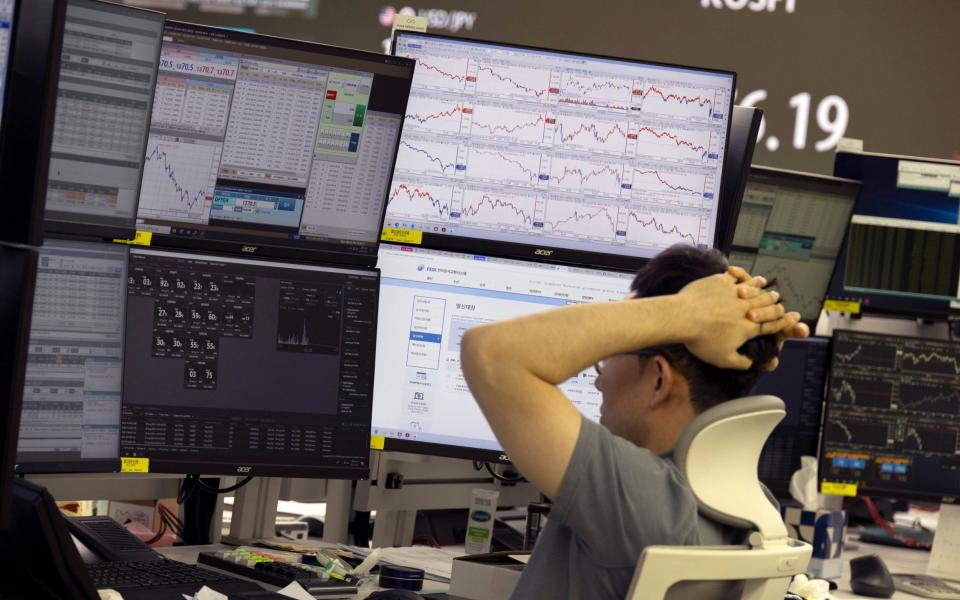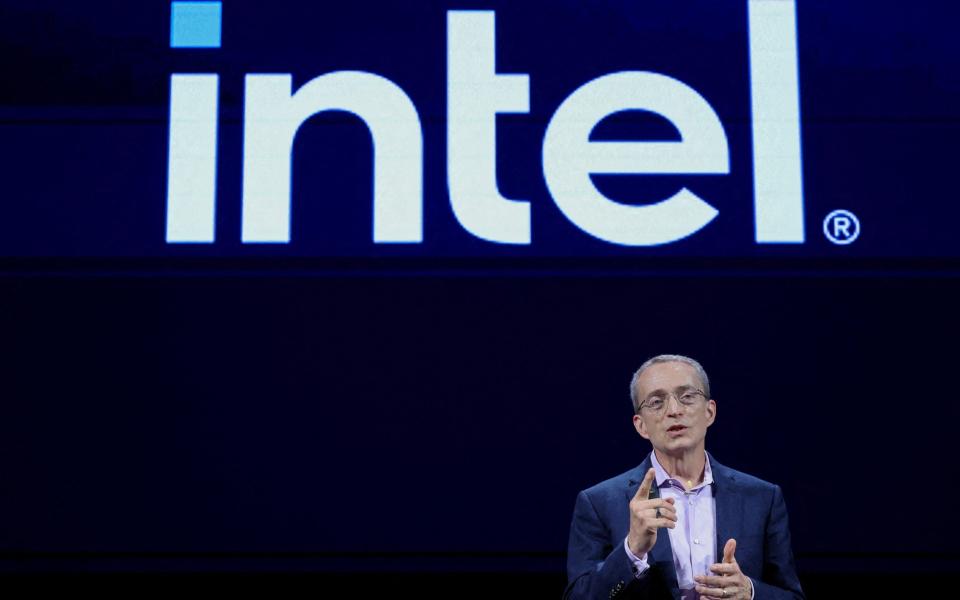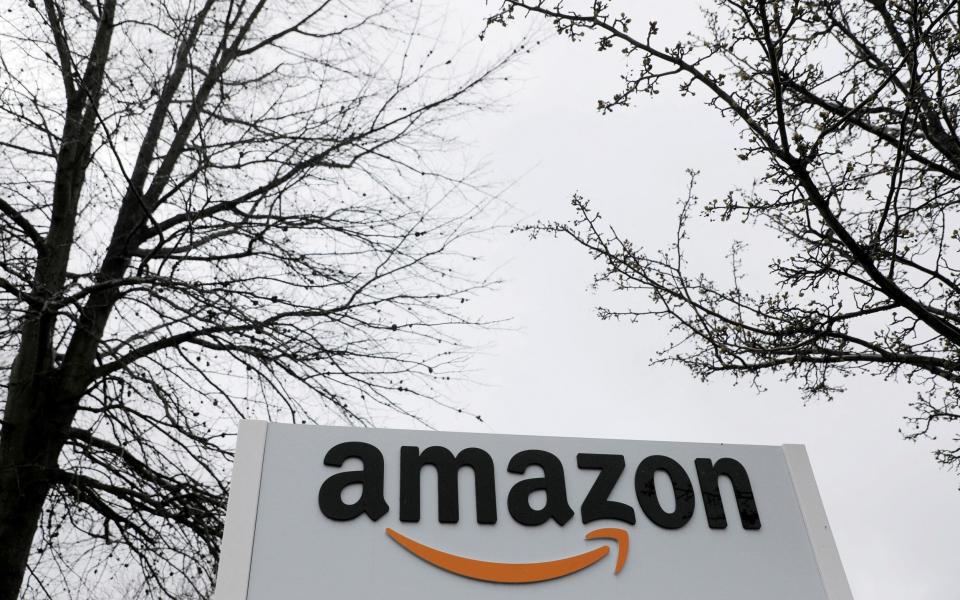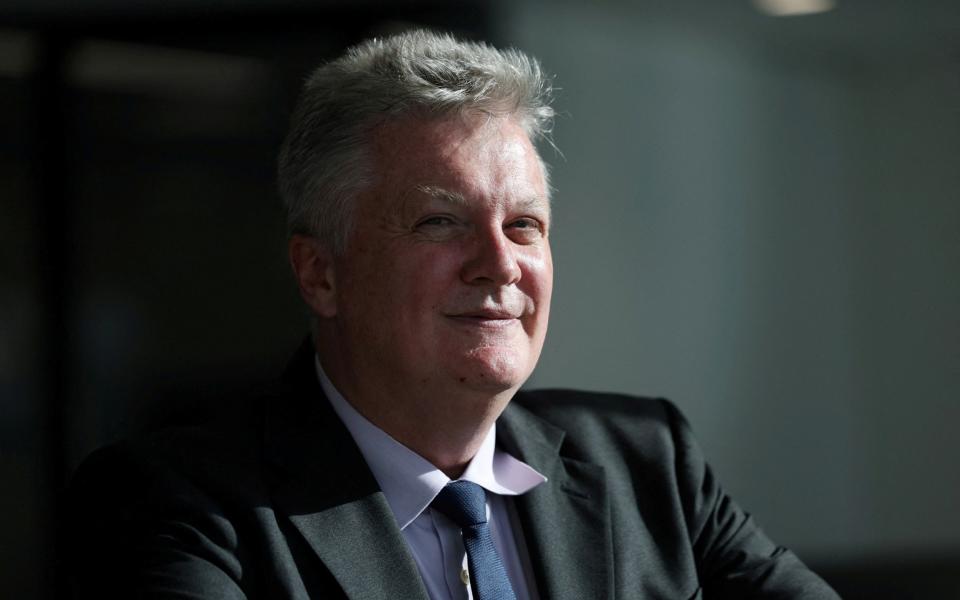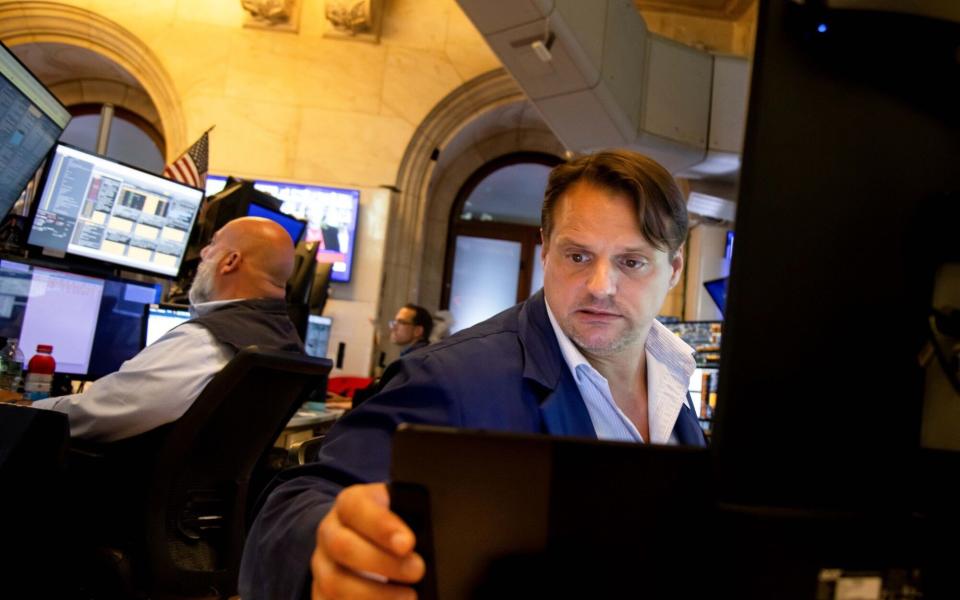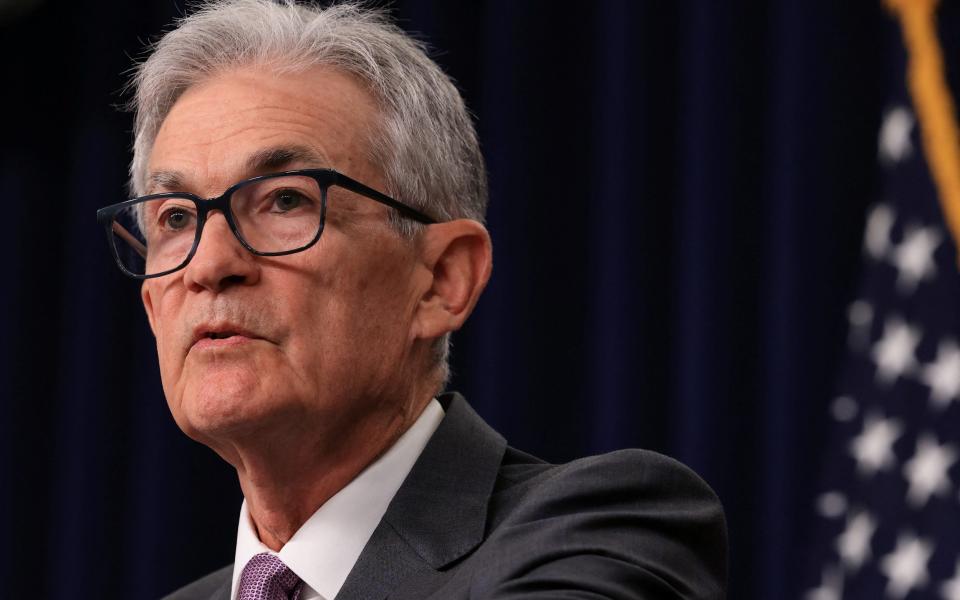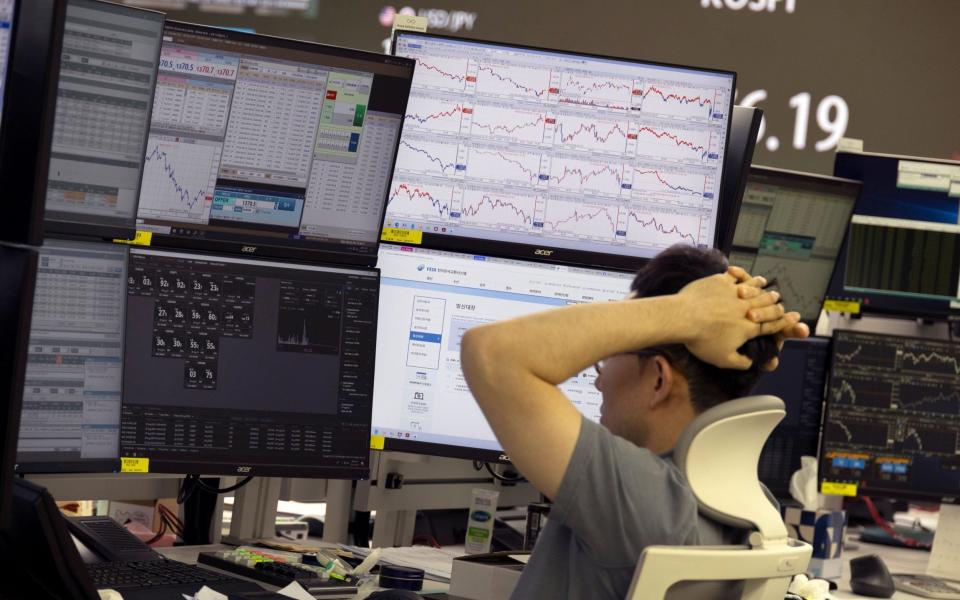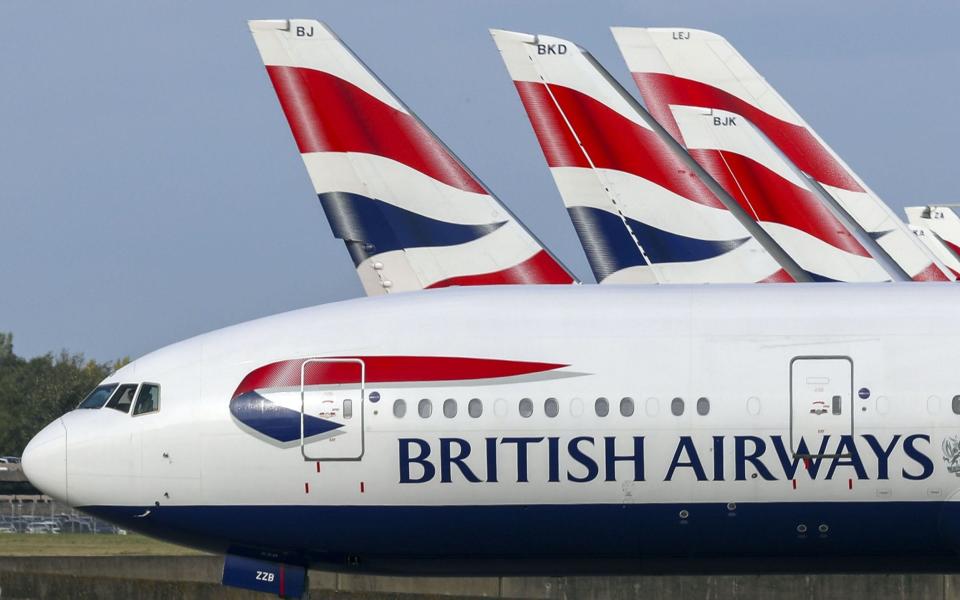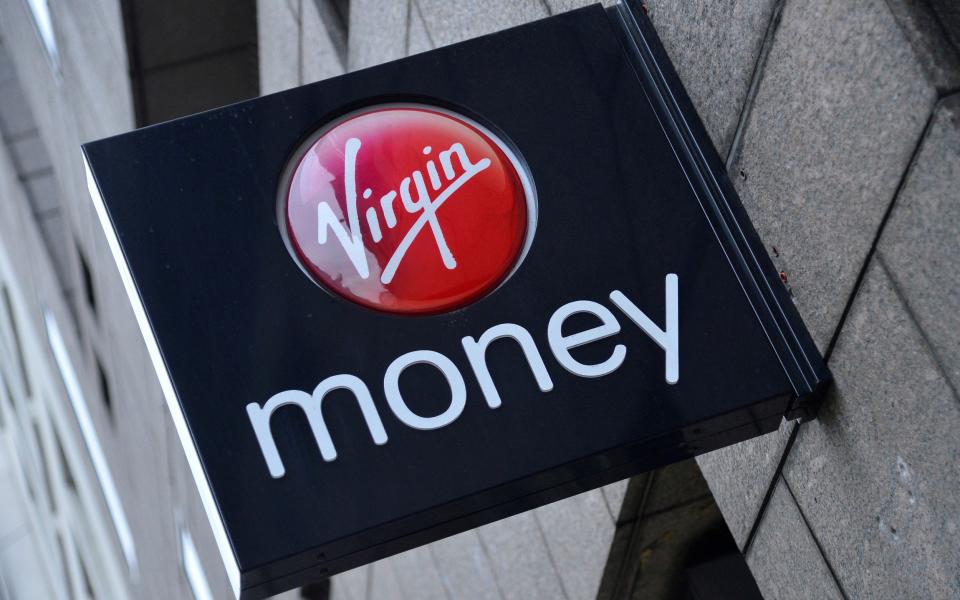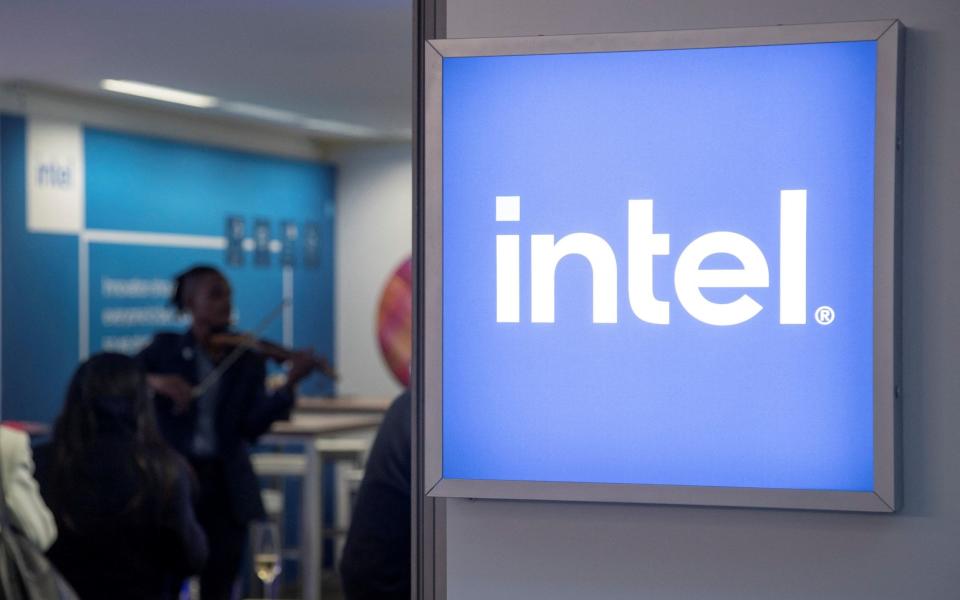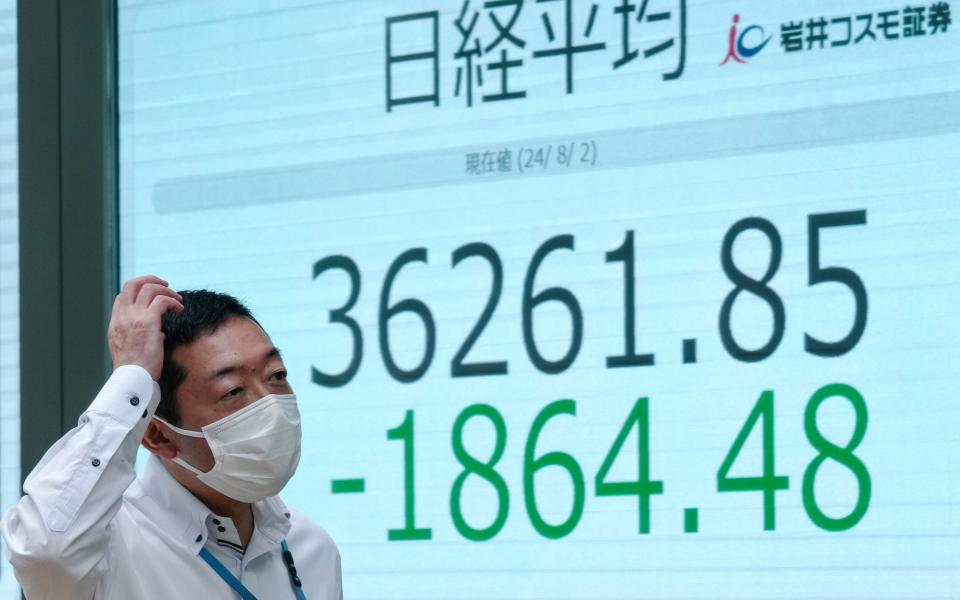The global sell-off in stock markets deepened as US unemployment hit a three-year high amid growing fears that the US Federal Reserve has left it too late to begin cutting interest rates.
Nonfarm payrolls grew by 114,000 in July, which was down from a downwardly revised 179,000 last month and much lower than the 175,000 expected by analysts.
The unemployment rate also rose to 4.3pc from 4.1pc, its highest level since October 2021.
The pan-European Stoxx 600 index fell as much as 2.3pc to a three-month low, while Germany’s Dax also dropped as much as 2.3pc. The Cac 40 in France dipped as sharply as 1.4pc. The FTSE 100 fell as much as 0.8pc.
Japan’s Nikkei 225 index had already closed down by 2,216.63 points - its second-largest points drop in history - after weaker than expected US factory data showed output dropped to an eight-month low in July, while weekly initial jobless benefit claims by Americans rose to the highest level in nearly a year.
Federal Reserve chairman Jerome Powell indicated on Wednesday that a first interest rate cut could come in September as policymakers held interest rates at 23-year highs of 5.25pc to 5.5pc.
However, markets around the world dropped sharply overnight and this morning as traders priced in that the Fed will be forced to cut interest rates at all three of its remaining meetings this year.
Traders have bet there is a 50pc chance that the Fed will use one of those meetings to cut borrowing costs by half a percentage point, and have forecast that policymakers will to make 1.75 percentage points of interest rate cuts over the next 12 months in a race to avoid a recession.
The sell-off was exacerbated by poor results from Big Tech giants on Wall Street as results from Apple, Intel and Amazon failed to impress.
Kiyoshi Ishigane, chief fund manager at Mitsubishi UFJ Asset Management, said: “I didn’t expect stocks to fall this much.
“This is probably because there are concerns that the US economy will collapse in a big way, which is the most unpleasant pattern for Japanese stocks.”
José Torres, a senior economist at Interactive Brokers, said: “The short-lived satisfaction of Fed chief Powell communicating decent odds of a September rate cut has turned sour as investors are now panicking that the central bank isn’t trimming soon enough.”
Read the latest updates below.
06:37 PM BST
Signing off...
Thanks for joining us today.
The Markets blog will be back on Monday morning but I’ll leave you with more on the Government’s decision to axe £1.3bn of supercomputer projects. Our technology editor James Titcomb reports:
Sir Keir Starmer has cancelled more than £1bn in funding for supercomputer projects announced under the previous Conservative government.
The Department for Science, Innovation and Technology (DSIT) said it would not take forward £800m earmarked to build Britain’s most powerful supercomputer in Edinburgh.
It has also dropped a plan to spend £500m on artificial intelligence computing announced earlier this year.
The Government said it was making “difficult and necessary spending decisions” and that commitments by the previous government had been unfunded.
However, the decision was criticised by the Conservatives as “extremely short sighted”.
Britain’s biggest supercomputer, the Archer 2 facility in Edinburgh, ranks 49th in the global rankings but the most powerful US computer, Frontier, is more than 60 times as powerful.
The £800m had been promised for a successor that would be 50 times more powerful and work had already begun on building it, but the project is now believed to be on hold.
06:13 PM BST
Markets have ‘gotten ahead of themselves’ on interest rates, warns economist
While JP Morgan and Citibank analysts are predicting a half a percentage point cut to US interest rates next month, others are more sceptical.
Gregory Daco, chief economist for Ernst & Young, told Bloomberg:
Given Fed officials’ hawkish bias, I would anticipate this seals the deal for a September cut, but there will be resistance to a [half a percentage point] cut.
Joseph Lavorgna, chief economist at SMBC Nikko Securities, said:
If the Fed goes 50, it will look like panic.
He added that markets had “gotten ahead of themselves” in pricing big cuts.
06:01 PM BST
European shares have worst day in more than a year
Shares across Europe fell today, with the benchmark Stoxx 600 index closing down 2.7pc.
The index, which includes some of Britain’s biggest companies along with continental giants, had its worst fall since March 15 2023.
Meanwhile, France’s Cac 40 fell 1.6pc, while Germany’s Dax fell 2.3pc.
A handful of defensive stocks, companies which tend to provide consistent dividends and stable earnings regardless of the state of the overall stock market, were the rare winners.
Individual heavyweights such as consumer staples giants Unilever and Nestle and healthcare firms AstraZeneca and Sanofi gained between 0.3pc and 1.3pc.
05:52 PM BST
Major volatility in share prices ‘will probably be short-lived’
Investors should be ready for “some major volatility”, a New York advisory firm has said. Michael Purves, chief executive of Tallbacken Capital Advisors, said:
This is a good excuse for investors to sell after a huge year to date rally. Does this weaker jobs number portend a recession that’s coming two quarters from now? There’s a lot of conflicting data.
Investors should be prepared for some major volatility, particularly in the big tech stocks. But it will probably be short-lived. The earnings reports haven’t been blockbuster, but they haven’t been bad either.
05:44 PM BST
Biden issues statement saying US ‘making progress’ on economy
While many investors have been selling today, the White House has issued a statement pointing to the strength of the American economy. President Joe Biden said:
Today’s report shows employment is growing more gradually at a time when inflation has declined significantly. Business investment remains strong thanks in part to our investing in America agenda, which is creating good-paying jobs in communities that have been left behind.
There’s more to do, but we’re making progress growing the economy from the middle out and the bottom up.
But Senator Elizabeth Warren, a leading Left-wing Democrat, said Fed chairman Jerome Powell “made a serious mistake not cutting interest rates” in the central bank’s most recent meeting.
“The jobs data is flashing red,” she added in a social media post.
Fed Chair Powell made a serious mistake not cutting interest rates. He's been warned over and over again that waiting too long risks driving the economy into a ditch.
The jobs data is flashing red.
Powell needs to cancel his summer vacation and cut rates now — not wait 6 weeks. https://t.co/PmzEi45Ggi
— Elizabeth Warren (@SenWarren) August 2, 2024
Nationwide Mutual Insurance Company chief economist Kathy Bostjancic warned the the latest data’s “across-the-board weakness” feeds the view that the Fed is late to easing monetary policy.
“The bond market is pricing in much more aggressive rate cuts” of at least one percentage point by year-end, she added in a note.
05:34 PM BST
Tech-heavy Nasdaq sinks in ‘old-fashioned correction’
Worries over tech earnings and a slowing US economy slammed the Nasdaq Composite index on Friday, putting it on track for a 10pc decline from its early July record high, commonly termed a “correction” by market participants.
The tech-heavy index was down around 3pc this afternoon, after a softer-than-expected jobs report spurred worries over whether the Federal Reserve will need to deliver hefty rate cuts at its next meeting to prevent the economy from spiraling into recession. Disappointing earnings from Amazon and Intel have also spooked investors.
The Nasdaq has dropped 10.4pc from its record close of 18,647.45 points on July 10. An index or stock is widely considered to be in a correction when it closes 10pc or more below its previous record closing high.
Tom Plumb, chief executive and portfolio manager at Plumb Funds, said:
This is an old-fashioned correction going on. We passed the economic torch from the perception of growth to the perception of needing government intervention with lower interest rates to stabilise the economy.
Over the last 44 years, the index has slipped into correction territory after hitting a new high 24 times, or about once every two years, according to a Reuters analysis of LSEG data.
The Nasdaq is still up 12pc this year.
05:27 PM BST
Bank of America believes the US market has peaked for 2024
America’s benchmark S&P 500 index has probably already made the gains it is going to make, according to analysis by Bank of America.
Savita Subramanian, the firm’s head of US equity and quantitative strategy, said that “a full-fledged bear market is unlikely” in comments quoted by Bloomberg earlier this week.
Mr Subramanian reportedly said that there is potential for strong returns in some areas, including among strong dividend payers and “old school” businesses in infrastructure, construction and manufacturing.
05:20 PM BST
Market drops on fears of a ‘hard landing’ in America
Global stock markets are down 2.2pc, according to the MSCI World index, as fears abound today that the US is headed for a hard landing.
The US Federal Reserve has for months been looking for confirmation that inflation is well on the way down and that the labour market is softening before cutting rates.
It has largely been confident it could achieve a “soft landing” - slowing the economy down without tipping it into recession.
Briefing.com analyst Patrick O’Hare said:
And just like that, the market is worried about the US economy suffering a hard landing.
A sober market didn’t need any more cold water poured on it, but that is exactly what it got with the July employment report, which was filled with ample headline disappointment.
05:07 PM BST
FTSE 250 has biggest drop in nearly two years
The FTSE 250 fell nearly 3pc today, on its worst day since September 29 2022.
Some 241 of its members closed down on a day of red ink across world markets.
Carnival led the declines, with shares down 8.5pc.
05:01 PM BST
JPMorgan predicts half-point Fed cuts in September and November
Banking giant JPMorgan has said it expects half a percentage point interest rate cuts in both September and November.
Meanwhile, economists at Citi have said they expect half-point rate cuts in September and November and a quarter-point cut in December, according to a Bloomberg report. It previously predicted quarter-point cuts at each of the three meetings.
04:58 PM BST
FTSE 100 closes down in worst day since April
The FTSE 100 fell 1.3pc, the biggest drop since April 16. HSBC contributed the most to the index’s decline, because of its sheer size, and fell 3.4pc. But Unilever provided the biggest boost, rising 1.3pc.
BA owner IAG had the biggest share price swing, in percentage terms, up 4.7pc, followed by toothpaste maker Heleon, which rose 2.7pc. At the other end of the index, Intermediate Capital Group dropped 7.13pc, while distribution group Diploma fell 7pc.
04:52 PM BST
Spain’s Iberdrola to buy Electricity North West
Spanish energy giant Iberdrola has agreed to buy a majority stake in British power network Electricity North West for €2.5bn (£2.1bn).
Electricity North West operates a distribution grid for around five million people in northwestern England including cities such as Manchester and Lancaster. It was formerly part of the North West Electricity Board, before privatisation in 1990.
The deal is to buy 88 percent of the company from a consortium of investors from Japan led by Kansai Electric Power Company. The remaining 12 percent of Electricity North West will stay in the hands of the consortium.
Iberdrola already operates distribution grids in Britain through its ownership of Scottish Power.
The deal still must be approved by regulators.
04:44 PM BST
US oil giant abandons California after 150 years over ‘harsh’ green policies
One of America’s biggest oil companies is to abandon its headquarters in California amid a backlash against “harsh” green policies. Industry editor Matt Oliver reports:
Chevron on Friday said it would relocate to Houston, Texas, breaking a historic association with the Golden State that stretches back to the 1870s.
Chevron’s decision follows repeated warnings from bosses that stringent environmental regulations and other moves by the Californian government had made doing business there too difficult.
It is the latest oil company to walk away from the state, while other employers such as Elon Musk’s SpaceX have also relocated following rows with state authorities about new legislation.
In January, Chevron wrote up to $4bn (£3.1bn) off the value of its assets there and complained the “increasingly harsh regulatory environment” was deterring investment.
04:40 PM BST
Turkey blocks Instagram, claiming ‘censorship’
Turkey blocked access to social media platform Instagram today for allegedly failing to comply with the country’s “laws and rules”.
The move came after a senior Turkish official accused the platform of blocking condolence posts following the assassination of Ismail Haniyeh, leader of Hamas.
Abdulkadir Uraloglu, the country’s transportation and infrastructure minister, said:
“We warned Instagram about certain offences. We want some rules to be followed ... We intervene when they disregard legal rules and public sensitivities.
“We are in contact with them. Our sensitivities are clear, as soon as they correct those shortcomings, we will remove the ban. This is a country with laws and rules.”
On Wednesday, Turkish communications official Fahrettin Altun criticised Instagram for what he called its decision to block condolence posts after Haniyeh was killed in Tehran.
“This is censorship, pure and simple,” Mr Altun said.
The Telegraph has approached Instagram owner Meta for comment.
04:39 PM BST
US crosses tripwire historically indicating a recession
The US unemployment rate’s jump to 4.3pc in July crossed a tripwire that historically has signalled that the United States is in recession - though economists say the gauge probably is not reliable in the topsy-turvy post-pandemic economy.
Hiring may have been disrupted by Hurricane Beryl, which slammed the Texas economy last month. Julia Pollak, chief economist at the job marketplace ZipRecruiter said that employers have cut workers’ hours and put some on temporary layoffs - perhaps signalling that they are optimistic that Fed rate cuts will turn things around.
Ms Pollak said:
They’re not cutting jobs outright. They are just slowing hiring and putting people on temporary layoff, furlough. They want to get back to business. They see lots of opportunities to expand. They they just need rates to be [lower].
The so-called Sahm Rule, named after the former Fed economist who came up with it, Claudia Sahm, holds that a recession is almost always already underway if the unemployment rate (based on a three-month moving average) rises by half a percentage point from its low of the past year. The jump to 4.3pc unemployment crossed the threshold.
However, Ms Sahm, now chief economist at the investment firm New Century Advisors, said before the unemployment data came out that this time “a recession is not imminent’’ even if the Sahm Rule were triggered.
That is partly because America’s jobs numbers have been unsettled by an unexpected surge in immigration, much of it illegal, over the past couple of years.
The new arrivals have poured into the American labour force and helped ease labour shortages across the economy. But not all of them have found jobs right away, pushing up the jobless rate.
04:23 PM BST
German bond yields hit one-year low as weak US data shakes markets
German government bond yields tumbled today to their lowest level in more than a year as investors snapped up sovereign debt after weak US economic data raised fears for global growth and caused stocks to fall sharply.
Germany’s two-year bond yield, which is particularly sensitive to European Central Bank rate expectations, fell more than 0.12 percentage points to 2.326pc, its lowest since March 2023.
Germany’s 10-year bond yield, the benchmark for the euro zone, hit 2.149pc at one point this afternoon, the lowest since January. It is currently down 0.08 percentage points at 2.17pc.
Torsten Slok, chief economist at Apollo Global Management, said he now expects the Fed to cut rates in September. He previously expected the central bank to hold rates for all of 2024.
He said:
With inflation coming down and the labour market softening we now think the Fed will cut rates [a quarter point] in September. But with GDP in the second quarter coming in at 2.8pc, the economy is not crashing.
04:19 PM BST
London stocks continue to slide amid US worries
Share prices continue to deteriorate in London amid major pessimism about the US economy.
The FTSE 100 is down 1.4pc right now. Only 14 stocks out of 100 have risen.
Meanwhile, the mid-cap FTSE 250 has lost 3pc. Only six stocks out of 250 have risen.
04:02 PM BST
Fed ‘made a policy error’ in not cutting rates this week
The US central bank made an error by not cutting interest rates this week, a wealth manager has said.
Jamie Cox, managing partner at Harris Financial Group in Virginia, said:
The jobs data are signaling ... that the Federal Reserve made a policy error by not reducing the Fed Funds rate this week.
It’s very possible the Fed alters its inter-meeting communications on the balance of risks to remove all doubt [about a] September rate cut.
03:56 PM BST
Vodafone-Three £15bn merger delayed further as watchdog extends probe
Vodafone and Three will have to wait longer before finding out if a £15bn planned merger has the seal of approval from the UK’s competition regulator.
The Competition and Markets Authority (CMA) said it had extended the period of time it needs to investigate the deal.
The plans to combine have been under scrutiny since being announced last summer, delaying what would create the UK’s largest mobile phone network.
The two mobile firms say the deal will allow them to invest more in their services and better compete with major rivals, EE operator BT and Virgin Media-O2.
In an update published on Friday, the CMA said it was giving itself until December 7 to complete the probe and publish its findings.
The extension reflects the “very wide scope” of the inquiry and the “technical and regulatory complexity of the sector”, the watchdog said.
It has also been taking time to examine large quantities of evidence provided by both businesses.
A spokesman from Vodafone said it was “not unusual” for the regulator to extend its investigations. It said:
We appreciate the additional time it is taking to assess the extensive evidence submitted, which sets out how this transaction will significantly benefit over 50 million mobile customers, enhance competition and help transform the UK’s digital infrastructure.
03:53 PM BST
Investors worry rate cuts ‘too late to stave off a US recession’
Red ink abounds in the world’s stock markets this afternoon after US unemployment rose in the US and the country’s latest payrolls report was weaker than expected.
Chris Beauchamp, chief market analyst at online trading platform IG, said:
In the space of barely two days markets have gone from looking forward to a Fed rate cut in a growing economy to fretting about an impending recession.
Today’s huge payrolls miss and the surge in the US unemployment rate has sparked a fresh flight from risk assets already reeling from some poor earnings reports and concerns about a wider conflict in the Middle East.
Investors are now hoping for a [half a percentage point] rate cut in September, but worry that even this will be too little, too late to stave off a US recession.
03:43 PM BST
Fed ‘seizing defeat from the jaws of victory’
The S&P 500 has dropped by 2.5pc this afternoon, potentially on track for its worst day since 2022, on a bruising day for investors.
The blue-chip Dow Jones has fallen 1.9pc and the Nasdaq Composite is down 3.3pc.
It was just a couple days ago that US stock indexes jumped to their best day in months after Fed chairman Jerome Powell gave the clearest indication yet that inflation has slowed enough for cuts to rates to begin in September.
Now, worries are rising the Fed kept its main interest rate at a two-decade high for too long in its zeal to stifle inflation. A rate cut would make it easier for US households and companies to borrow money and support the economy, but it could take months to a year for the full effects to filter through.
Brian Jacobsen, chief economist at Annex Wealth Management, said:
The Fed is seizing defeat from the jaws of victory. Economic momentum has slowed so much that a rate cut in September will be too little and too late. They’ll have to do something bigger than [a quarter of a percentage point] to avert a recession.
Traders are now betting on a nearly two-in-three chance that the Fed will cut its main interest rate by half a percentage point in September.
That is despite Mr Powell saying on Wednesday that such a deep reduction is “not something we’re thinking about right now.”
03:39 PM BST
Big Tech firms in ‘bubble land’, warns $70bn investment manager
A major American investment manager has warned its clients that the megacap technology stocks, particularly Nvidia, are in “bubble land”.
In a letter to investors seen by the FT, Elliot Investment Management said that AI is “overhyped with many applications not ready for prime time”.
Nvidia’s prodigious share price growth relies on AI tech that is “overhyped”, it said.
Elliot and Nvidia both declined to comment.
03:33 PM BST
Oil prices slump amid US recession fears
Oil prices dropped to their lowest level since June amid fears that a recession in the US would weaken demand from the world’s largest economy.
Brent crude, the international benchmark, slumped by 3pc towards $77 a barrel after the latest payrolls report was weaker than expected and deepened concerns that America is at risk of recession.
US-produced West Texas Intermediate was down 3.4pc below $74.
With that, I will sign off for the day and hand over the reins to Alex Singleton, who will keep you up to speed on this dramatic day in global markets.
03:16 PM BST
Don’t bet on more interest rate cuts yet, says Bank of England chief economist
Borrowers should not expect more rate cuts yet as “we cannot declare ‘job done’” in the fight against inflation, the Bank of England’s chief economist has warned.
Our deputy economics editor Tim Wallace watched his speech:
Huw Pill, who voted to hold interest rates at 5.25pc even as the majority of the Bank’s Monetary Policy Committee (MPC) on Thursday chose to cut borrowing costs to 5pc, said there is still a risk that prices are not fully under control.
He said: “We cannot be complacent, we cannot declare ‘job done’. We shouldn’t yet be promising that rates are going to move down further in the very short term.”
Financial markets anticipate another two cuts this year, taking borrowing costs to 4.5pc at December’s MPC meeting.
It comes amid growing concerns that the US Federal Reserve in particular made a mistake by failing to cut rates at its meeting this week.
But Mr Pill urged caution. Addressing business bosses, he said there is a risk that the pandemic and the energy price shock following the Russian invasion of Ukraine may have changed the nature of the economy to put more pressure on prices and wages, even though headline inflation has returned to the Bank’s 2pc target.
“If those structural changes are more lasting they would imply greater inflationary pressure and therefore provide the rationale for not normalising monetary policy… at such a rapid rate,” he said.
03:07 PM BST
Pound rebounds as markets bet on US interest rate cuts
The pound has leapt higher after the US economy added far fewer jobs than expected, raising concerns that America is at risk of recession.
Sterling jumped 0.7pc against the dollar to $1.283 as money markets rapidly priced in interest rate cuts by the Federal Reserve as businesses buckle under the pressure of high borrowing costs.
The sharp rise in the pound comes just a day after it lost 1pc following the Bank of England’s decision to cut interest rates for the first time in four years.
By contrast, sterling is down 0.3pc against the euro, which has broken back above 85p for the first time in a month.
02:55 PM BST
Intel suffers worst share plunge since 1982
Over $35bn (£27bn) was wiped off the value of Intel today after its quarterly results spooked investors.
Investors dumped the chipmaker, causing its shares to plummet by 28pc
After Wall Street markets closed last night, the chipmaker said it would cut more than 15pc of its workforce, some 17,500 people, and suspend its dividend.
Intel also forecast revenue below market estimates, grappling with a pullback in spending on traditional data centre semiconductors and a focus on AI chips, where it lags rivals.
The American giant was dominant in the 1990s as consumers invested heavily in Windows PCs and demanded machines with the “Intel Inside” logos.
But the rise of smartphones from the likes of Apple and Samsung has grabbed consumer spending, and these devices run rival chips.
Meanwhile, it has been taken over in size by Nvidia, once seen as a mere manufacturer of graphics chips, but now the chip industry’s top player in artificial intelligence.
Mania around AI has propelled stock prices higher in America this year, but Intel’s shares have fallen since January.
02:55 PM BST
Fed should cut rates by half a point in September, says top Obama advisor
James Furman, a Harvard professor and former chair of the Council of Economic Advisers under Barack Obama, is calling for the Federal Reserve to take strong action at its next interest rate meeting:
As a result, the Fed should and will cut in September. The only question is whether to do 25bp or 50bp--and if the unemployment rate rises or possibly even stays here my vote would be for 50bp.
— Jason Furman (@jasonfurman) August 2, 2024
02:45 PM BST
Amazon takes $197bn hit in Big Tech sell-off
Amazon shares plunged by 10pc as trading began on Wall Street, wiping $197bn off its value as a major sell-off in Big Tech stocks swept global markets.
The e-commerce giant reported slowing online sales growth in the second quarter and said cautious consumers were seeking out cheaper purchase options.
02:33 PM BST
Wall Street stocks plunge after US jobs shock
Stock markets in New York plunged at the opening bell amid fears that the US economy is heading for a recession.
The tech-heavy Nasdaq Composite plunged 2.5pc as trading began, while the broad-based S&P 500 dropped 1.6pc.
The Dow Jones Industrial Average sank by 1.2pc amid fears that the Federal Reserve has left it too late to begin cutting interest rates, with the US economy adding much fewer jobs than expected last month and unemployment hitting a three year high.
02:26 PM BST
UK and European markets slump after US jobs blow
The FTSE 100 deepened its losses to 0.8pc after the US jobs report but it was still the best performer among major European markets.
The Dax in Frankfurt plunged by as much as 2.3pc while the Cac 40 in France dipped as sharply as 1.4pc.
02:20 PM BST
Wages grow at slowest pace since 2020
To recap what has happened, the US jobs market has slowed down much more than expected with the unemployment rate reaching its highest since late 2021 and wages rising at their slowest pace in four years.
The world’s biggest economy added 114,000 jobs last month, down from June’s downwardly revised 179,000 figure, according to the Department of Labor.
The jobless rate rose to 4.3pc, the highest level since October 2021, bringing the Federal Reserve a step closer to its first rate cut in five years.
The Labor Department said: “Employment continued to trend up in health care, in construction, and in transportation and warehousing, while information lost jobs.”
It added that government employment, which slowed in recent months, was little changed in July.
In July, average hourly earnings rose less than analysts expected by 0.2pc to $35.07. On an annual basis, wage growth slowed to a rate last seen in 2020.
📉The private sector only added 97k jobs in July -- the weakest since March 2023 and December 2020 before that -- while the government sector once again contributed favorably to the headline print driven by a 26k gain in local education jobs pic.twitter.com/3wCB318kWW
— Gregory Daco (@GregDaco) August 2, 2024
02:10 PM BST
Jobs shock is ‘uh oh moment’ for stock markets, say analysts
The dramatic undershoot in the US jobs figures has delivered an “uh oh moment” for global stock markets analysts have said.
Neil Birrell, chief investment officer at Premier Miton Investors, said:
US employment data couldn’t have been released at a more sensitive time; markets are wobbling, concerns over Fed policy abound and corporate earnings are in the spotlight.
The weak data will cause more angst, and concerns over the health of the economy will increase.
We have pivoted from looking at a robust economy to a weakening one and while markets will reflect this, they will also price in the fact that the Fed still has plenty of scope to act.
Here are some other analyst views:
🇺🇸July #jobsreport: A "uh-oh" moment...
⚠️Payrolls +114k
🟠Private +97k
🟠Gds +25k
🟠Svc +72k
🟠Gov +17k🔻Diffusion 50%
🔻Revision -29k🔻Hours -0.3%
🟠#Unemployment 4.3% (+0.2pt)
✅Part rate 62.7% (+0.1pt)💵Wage -0.1% m/m
⤵️Growth 3.3% y/y (-0.2pt) pic.twitter.com/zXhXiDEPhX— Gregory Daco (@GregDaco) August 2, 2024
01:57 PM BST
Government borrowing costs tumble amid bets on rate cuts
Government borrowing costs are falling as money markets rapidly realign amid fears that the US economy is at risk of recession.
The yield on 10-year US Treasury bonds - the return the government promises to buyers of its debt - has plunged 13 basis points to 3.85pc - its lowest level in 2024.
The two-year Treasury yield - which is more sensitive to interest rate movements - has dropped as much as 29 basis points to 3.86pc - its lowest point in a year.
It comes as money markets ramp up bets on interest rate cuts, as they expect the Federal Reserve to dramatically reduce borrowing costs in a bid to avoid a recession.
Traders have bet that the Fed will cut rates by nearly two full percentage points over the next year to a range of 3.25pc to 3.5pc.
In Britain, the Bank of England is expected to cut rates once more this year, with traders now pricing in a 92pc chance of a second cut by the end of 2024.
01:45 PM BST
US stock markets on track to plunge after jobs shock
Wall Street extended declines in premarket trading after the US added fewer jobs than expected in July, spurring worries about the health of the world’s largest economy.
The Labor Department’s report showed nonfarm payrolls rose by 114,000 jobs in July, where economists had forecast an increase of 175,000.
The unemployment rate ticked higher, to 4.3pc, from 4.1pc a month ago.
In premarket trading, the Dow Jones Industrial Average was down 486 points, or 1.2pc, the S&P 500 fell 91.75 points, or 1.7pc, and the Nasdaq 100 had dropped 447 points, or 2.4pc.
01:31 PM BST
US adds fewer jobs than expected in blow to economy
The US added fewer jobs than expected in a further sign that the world’s largest economy is struggling under the weight of high interest rates.
Nonfarm payrolls grew by 114,000 in July, which was down from a downwardly revised 179,000 last month and much lower than the 175,000 expected by analysts.
The unemployment rate also rose to 4.3pc from 4.1pc, its highest level since October 2021.
01:27 PM BST
US jobs report due imminently
Analysts are showing their angst ahead of the US non-farm payrolls data due shortly, which could deepen the sell-off in global markets:
Y'all ready for the biggest jobs report of our lives?
— Callie Cox (@callieabost) August 2, 2024
01:22 PM BST
Dollar slips ahead of US jobs figures
The dollar has slipped as investors fret that US payrolls data could be weak after an unexpected slump in manufacturing raised concerns about a slowdown in the world’s largest economy.
The pound is now up against the greenback by 0.1pc to $1.275 after a sharp fall on Thursday following the Bank of England’s decision to cut interest rates for the first time in four years.
The yen firmed, pushing the dollar down 0.2pc to 149.04, building on gains in the wake of a Bank of Japan decision to raise rates and strengthening as far as 148.51 overnight for the first time since mid-March.
The Swiss franc was about 0.2pc higher at 0.8707 per dollar, having reached its highest since early February at 0.8698.
01:05 PM BST
Pill warns policymakers should not promise more interest rate cuts
The chief economist of the Bank of England has warned that policymakers should not promise that interest rates in Britain will drop further.
In a speech given a day after the Bank announced its first rate cut in four years, Huw Pill said “we can’t be complacent” about inflation.
Mr Pill was one of four members of the Monetary Policy Committee to have voted for interest rates to be held at 5.25pc. They were outvoted by a majority of five to four.
Mr Pill warned that wages are still growing strongly and said the Bank of England still needs to bear down on bits of inflation.
Policymakers have been concerned that services inflation has remained persistent at 5.7pc, risking a rebound in the pace of price rises despite the overall consumer prices index falling back to the Bank’s 2pc target.
12:56 PM BST
First-time buyers driving mortgage demand, says Skipton
Away from global stocks, building society Skipton has ramped up the amount it lent to first-time homebuyers, who it said are driving demand for mortgages.
The property group also said more savers were shopping around for better rates and locking away their money into ISAs.
Skipton, which includes the building society and estate agency Connells Group, reported higher earnings and a growing mortgage book.
Mortgage lending jumped by more than a 10th to £30bn in the first six months of the year, compared with the same period in 2023.
First-time buyers made up 41pc of all new loans, compared with less than a third last year, despite facing interest rates at their highest level since the global financial crisis in 2008.
Skipton said that despite predictions that the mortgage market would slow this year, 2024 has been “encouragingly buoyant so far”.
The volume of applications for mortgages has grown, and the building society said first-time homebuyers were driving the highest proportion of demand.
12:39 PM BST
Traders increase bets on half a percentage point US rate cut
Traders are betting that there is a 31pc chance that the US Federal Reserve will announce a jumbo half a percentage point interest rate cut next month to insure against an economic downturn.
So-called swaps markets show that there is a 50pc chance that one of the Fed’s cuts in 2024 will be by half a percentage point - or 50 basis points in the language used by traders.
Money markets indicate the Fed will cut rates by 1.75 percentage points over the next 12 months, including consecutive cuts at its next four meetings.
The market jitters come ahead of the monthly US non-farm payrolls report, which economists forecast will show job growth dropped to 175,000 in July from 206,000 in June.
SEB US economist Elisabet Kopelman said: “The historical experience is that turnarounds in the labour market can occur quickly and brutally and that relatively moderate increases in unemployment have been enough to trigger recessions in the United States.”
Fidelity International fixed income manager Shamil Gohil added that any rise in the unemployment rate “will give us clues about a weaker labour market and as a potential recessionary signal”.
12:10 PM BST
Exxon Mobil profits jump after record production in oil and gas fields
Exxon Mobil has revealed one of its largest second-quarter profits in a decade after record quarterly production from oil and gas fields in Guyana and the Permian basin in the US.
The energy giant earned $9.2bn (£7.2bn), or $2.14 per share, for the three months ended June 30, up from $7.9bn (£6.2bn), or $1.94 per share, during the same period last year.
The results topped Wall Street expectations as it was also boosted by its $60bn acquisition of Pioneer Natural Resources.
Chairman and chief executive Darren Woods said:
We achieved record quarterly production from our low-cost-of-supply Permian and Guyana assets, with the highest oil production since the Exxon and Mobil merger.
We also achieved a record in high-value product sales, growing by 10pc versus the first half of last year.
11:51 AM BST
Aston Martin raises £135m in fresh debt as it gears up for electric car switch
Aston Martin has raised about £135m from privately-placed debt as it seeks to boost its finances and accelerate its switch to electric vehicles.
The luxury carmaker said it would use the cash raised in senior secured notes to repay what it owes under its existing revolving credit facility.
The loss-making company - closely associated with James Bond - revealed earlier this month that it has set aside £2bn for its switch to electric cars in what its largest shareholder called a “pivotal moment” for the business.
The latest financial boost comes despite the company revealing in its half-year results that pre-tax losses deepened from £142.2m to £216.7m as it sold fewer cars.
Shares were down 2pc today amid the wider sell-off in global stock markets.
Chief financial officer Doug Lafferty said:
Following positive feedback after the results from the capital markets with encouraging demand from the company’s existing bond holders, we are pleased to announce today that we have successfully priced a £135m equivalent private placement.
These new senior secured notes, along with the refinancing completed in March 2024, provide Aston Martin with additional liquidity as we continue an exciting second half of the year.
11:35 AM BST
Ninetendo profits slump as gamers await successor to Switch
Nintendo revealed a 55pc drop in profits in the three months to June as it failed to release any new information about a promised Switch successor.
The Japanese video game maker said sales slipped in both machines and game software compared to last year.
Its flagship Nintendo Switch console is in its eighth year after sales began, with more than 140m already sold.
Earlier this year, president Shuntaro Furukawa said an announcement about a successor to the Switch will be made before April 2025.
The owner of the Super Mario and Pokemon franchises said profits totalled 81bn yen (£427m) in the second quarter, down from 181bn yen a year earlier.
Quarterly sales declined 46.5pc to 246.6bn yen.
Nintendo’s shares have recent fallen as the US dollar has weakened against the yen, trading at about 149 yen.
11:18 AM BST
Wall Street on track to plunge when trading begins
US stock markets are poised to fall sharply when trading begins amid fears that higher interest rates in the US will trigger an economic slowdown.
Amazon slumped 8pc in premarket trading after the company reported slowing online sales growth in the second quarter and said cautious consumers were seeking out cheaper options for purchases.
Apple slipped 0.8pc after it saw another sales drop in China, with other megacap stocks such as Microsoft, Tesla and Alphabet dropping more than 1pc each.
Wall Street’s “fear gauge” breached the long-term average level of 20 points for the first time since mid April.
All the major three indexes kicked off August with steep declines on Thursday after a round of economic data spurred fears of an economic slowdown after the US Federal Reserve kept interest rates at 23-year highs this week.
The benchmark S&P 500, the tech-heavy Nasdaq and the blue-chip Dow are on track to log losses for the week, despite the Fed opening the door to a September interest rate cut.
Investors will closely examine for the US nonfarm payrolls report before markets open for further signs that the US jobs market is slowing down. The data is expected to show nonfarm payrolls increased by 175,000 jobs in July, after advancing by 206,000 jobs in June.
In premarket trading, the Dow Jones Industrial Average was down 0.9pc, the S&P 500 has fallen 1.3pc and the Nasdaq 100 was down nearly 2pc.
11:04 AM BST
Wizz Air reveals hit from global IT meltdown
Wizz Air said the global technology outage directly disrupted about 1pc of its flights, while Ryanair has revealed it cancelled some 650 flights in July because of air traffic control delays.
The two airlines reported the impact of disruption as they unveiled how many passengers they flew last month.
The Hungarian low-cost airline carried 5.9m passengers last month, 1.4pc less than the six million it flew the previous year.
It said about 1pc of its scheduled flights in July were impacted by a flawed update rolled out by cybersecurity firm CrowdStrike, which led to major disruption around the world.
Meanwhile, Ryanair said it flew 20.2m passengers in July, an 8pc jump on the 18.7m people on its flights the same time last year.
It reflects growing demand after the company said its airfares were set to be substantially cheaper over the peak summer months.
Ryanair operated more than 110,500 flights in July, but revealed that 651 flights were cancelled because of air traffic control delays.
Chief executive Michael O’Leary called for reform of the service which he described as “hopelessly inefficient”.
10:46 AM BST
Why US interest rates turmoil has sent shares plunging around the world
Jerome Powell, arguably the most powerful man in the world economy, has spooked global markets and triggered a sharp share sell-off around the world.
Our economics editor Szu Ping Chan and deputy economics editor Tim Wallace analyse why this has happened:
German, French and Italian markets were all down 1pc or more this morning and the FTSE 100 dropped as much as 0.7pc following a plunge of almost 6pc in Japan overnight – the second worst points drop on record for the country’s Nikkei index.
It suggests that a bubble of sorts is at risk of bursting. Supported by buoyant US consumers, a big-spending government and the dream of an AI-powered future, stock markets had surged from record high to record high this year.
Traders and investors had seemed confident that Mr Powell, the chairman of the Federal Reserve, could engineer that most elusive of economic phenomena: the soft landing.
Read why investors are concerned that may not happen.
10:24 AM BST
Government borrowing costs fall amid bets on interest rate cuts
Bond markets have rallied as money markets price in a steep set of interest rate cuts by central banks amid fears that the US economy faces a downturn.
US Treasury bond yields - which moved inversely to prices and indicates the cost of government borrowing - fell for a seventh consecutive day to 3.95pc.
It comes as money markets price in three straight interest rate cuts by the Federal Reserve in its September, November and December meetings, with a 30pc chance that one of those cuts will be by half a percentage point.
Traders are betting that the US Federal Reserve will be forced to cut interest rates by 1.75 percentage points from their current range of 5.5pc to 5.25pc, which is the highest level since 2001.
The yield on 10-year UK gilts edged down to 3.87pc as money markets indicate the Bank of England will cut interest rates at least one more time this year, with a 69pc chance of a second cut before the end of 2024.
10:11 AM BST
China stocks closed sharply down amid global sell-off
China stocks closed lower after the weaker-than-expected US factory activity data sparked fears of a downturn.
The Shanghai Composite index closed down 0.9pc at 2,905.34 while the blue-chip CSI 300 index was down 1pc.
The Hang Seng index in Hong Kong finished down 359.45 points, or 2.1pc, at 16,945.51.
As well as the worries over the US economy, investors also faced growing tensions in the Middle East and data this week showing China’s manufacturing activity shrank sharply, while second quarter growth was also weaker than expected .
Zheng Yufei, an analyst at Guosen Securities, said: “Global markets have experienced wild swings, with investors flocking to safe assets on expectations that the Federal Reserve may cut interest rates sharply, while concerns about an economic slowdown and investment returns from technology giants have led to uncertainty and defensive investment trends.”
09:53 AM BST
Pound falls after interest rate cut
The pound has fallen to a one-month low against the dollar after the Bank of England cut interest rate for the first time in four years this week.
Sterling was down another 0.1pc to $1.273 after dropping by 1pc on Thursday as policymakers lowered borrowing costs from their 16-year highs.
The Bank of England cut rates to 5pc from 5.25pc, where they had stood for a year.
The pound was down 0.2pc against the euro, which is worth 84.9p, having dropped 0.6pc against the single currency on Thursday.
09:40 AM BST
British Airways owner scraps takeover of Air Europa
British Airways owner International Consolidated Airlines Group (IAG) has seen shares lift after it scrapped a deal to buy Spanish carrier Air Europa.
IAG shares rose 5.8pc in early trading to lead gains on the FTSE 100 after it confirmed the termination, posted its half-year results and dished out a first dividend since the pandemic.
The airline group, which also owns Iberia and Aer Lingus, said it has given up on efforts to buy Air Europa after EU regulators raised competition concerns over the deal.
IAG last year agreed a deal to buy the 80pc of Air Europa it did not already own for around €400m (£340m).
Late on Thursday, IAG also said it would hand shareholders their first dividend payment since the pandemic as it said travel demand remained strong.
09:25 AM BST
European markets plunge amid fears of US downturn
European shares have been hit hard by the global stocks sell-off triggered by worries over US growth.
The pan-European Stoxx 600 index fell as much as 1.7pc to a three-month low, while Germany’s Dax dropped as much as 1.6pc and the Cac 40 in France dipped as sharply as 1pc.
Italy’s FTSE MIB was down 1.4pc and the Swiss Market Index was down 2.3pc as global risk-off sentiment was triggered by a weak reading of US manufacturing activity on Thursday that dropped to an eight-month low in July.
However, French insurer AXA was up 1.1pc after BNP Paribas said it is in exclusive talks with the company to acquire its AXA Investment Managers arm for €5.1bn (£4.3bn).
09:13 AM BST
Labour Government shelves Sunak’s £1.3bn for AI investment
The new Labour Government has shelved £1.3bn of “unfunded” investment for UK tech and AI projects promised by the previous Conservative government.
The Department for Science, Innovation and Technology (DSIT) said no new funding for the programmes had been allocated in the previous government’s spending plans, and therefore will not be taken forward.
It included £800m for the creation of an exascale supercomputer at the University of Edinburgh and £500 million of additional funding for the AI Research Resource, a scheme which helps fund computing power for AI.
An additional £300m committed to the AI Research Resource has been committed to, the Government said, as this funding was already in place, has been distributed and will continue as planned.
A DSIT spokesman said:
We are absolutely committed to building technology infrastructure that delivers growth and opportunity for people across the UK.
The Government is taking difficult and necessary spending decisions across all departments in the face of billions of pounds of unfunded commitments.
This is essential to restore economic stability and deliver our national mission for growth.
08:51 AM BST
UK stocks plunge as US leaves interest rate cut ‘too late’
UK stocks have fallen amid a global sell-off over fears the US has left it too late to cut interest rates, risking damage to the world economy.
The blue-chip FTSE 100 index was down 0.4pc after logging its worst day in more than three months on Thursday as traders feared the impact of the Federal Reserve holding interest rates at their highest level since 2001.
The mid-cap FTSE 250 had plunged 1.2pc as investors were cautious ahead of a crucial jobs report in the United States, after Thursday’s weak manufacturing data stoked fears of an economic slowdown.
Both indexes are still, however, on track to log weekly gains on upbeat corporate earnings.
Personal goods stocks like Burberry fell as much as 1.9pc after Italian peer Salvator Ferragamo reported a 41pc decline in its first-half operating profit.
Banks fell as much as 1pc a day after logging their worst day since February 2022 after the Bank of England cut interest rates and as French lender Societe Generale cut its guidance for retail net interest income.
On the brighter side, precious metal miners gained 1.4pc as gold prices rose 0.8pc amid a rush to safe-haven assets following the stock market sell-off.
In corporate news, IAG climbed as much as 5.3pc to top the FTSE 100 after the British Airways owner terminated its proposed takeover of Spain’s Air Europa and restored its dividend.
08:38 AM BST
BA owner announces return of dividend for first time since pandemic
British Airways owner IAG announced the return of its dividend for the first time since the pandemic as it revealed higher profits.
The company, which also owns Aer Lingus and Iberia, said it would pay shareholders a three euro cents per share interim dividend after it increased operating profits by 3.9pc to $1.3bn (£1.1bn).
Shares rose 5.3pc to the top of the FTSE 100 as it reported “robust demand for travel”.
Chief executive Luis Gallego said:
We see continuing strong demand for travel in the attractive core markets in which we operate: North Atlantic, Latin America and intra-Europe.
We delivered a good performance in the first half of 2024, with operating profit €49 million ahead of the same period last year.
We are pleased to announce a return to paying a dividend, which reflects our confidence in the business, our performance and our transformation. We are delivering on our strategy and our commitment to sustainable shareholder returns.
08:27 AM BST
US employment figures could ‘exacerbate the current sell-off’
The weak manufacturing figures and data showing US weekly unemployment claims rose to an almost one-year high have raised the stakes for a highly-anticipated American employment report out later today.
Matt Britzman, senior equity analyst at Hargreaves Lansdown, said:
There are now concerns that the soft-landing scenario priced in for most of the year could be a pipe dream, and the Federal Reserve might have missed its chance to prevent an economic slowdown by not acting on rates earlier in the week.
US jobs are out today, and further weakness here will simply exacerbate the current sell-off. Bad news is back to being simply bad news.
08:10 AM BST
Virgin Money customers setting more aside for savings
Looking at London markets, Virgin Money has said its mortgages and lending dipped in recent months but reported strong demand for savings, as the bank prepares to be taken over by Nationwide by the end of the year.
Total lending to customers was 0.9pc lower, with mortgages dropping by 1.1pc, in the past three months, compared to the first half of its financial year.
But total customer deposits jumped by 2.4pc, driven by people opening ISA accounts at the start of the new tax year.
Virgin Money said it put some of its restructuring efforts on ice ahead of its acquisition by Nationwide, which it expects to be completed by the end of the year.
08:03 AM BST
UK stocks plunge amid fears of US recession
UK markets dropped sharply amid fears that the US Federal Reserve has risked a recession in America by leaving it too late to cut interest rates.
The FTSE 100 fell 0.5pc to 8,242.53 while the midcap FTSE 250 dropped 1.4pc to 21,290.41.
08:01 AM BST
Fed will cut rates at ‘recession cycle pace’, say analysts
Money markets are predicting the US Federal Reserve will race to cut interest rates over the next year in a bid to shore up the US economy.
Traders are pricing in 1.75 percentage points of cuts by the US Federal Reserve over the next 12 months.
Deutsche Bank’s global head of macro research Jim Reid said this is “the sort of pace that we’ve only seen in a recession in recent cycles”.
He said: “In addition, there was even mounting speculation the Fed would kick off the easing cycle with a larger 50bp move in September, with futures pricing in 33bps of cuts at that meeting, up +3.3bps from the previous day.”
07:45 AM BST
Government contractor Capita returns to profit amid ‘rapid’ cost-cutting plans
In corporate news, Capita has swung to a profit as the outsourcing giant said it is “on track” with cost-cutting plans.
The major contractor for the Government and local authorities said it was pressing ahead with a “rapid” cost-cutting plan late last year, with cuts to around 900 jobs.
The company told investors it has taken action to cut around £100m as part of a £160m cost-saving target by June 2025.
It came as Capita reported a pre-tax profit of £60m for the first half of 2024, up from a £67.9m loss a year earlier, amid a boost from savings and the sale of parts of the business.
Adolfo Hernandez, chief executive, said: “We have much more to do, but I am pleased that Capita is making encouraging progress in its journey to deliver its medium-term financial targets and create sustainable value for all its stakeholders.”
07:32 AM BST
Japan’s stocks suffer second worst day in history
Tokyo stocks closed dramatically lower after Wall Street shares tumbled over concerns about the US economy.
The benchmark Nikkei 225 index closed down 5.8pc, or 2,216.63 points at 35,909.70.
It was the second-largest points drop in the index’s history and its steepest fall since the start of the pandemic in 2020.
Meanwhile the broader Topix index in Japan lost 6.1pc, or 166.09 points, to hit 2,537.60 in its worst day since 2016.
It is now down more than 10pc since its July peak, as investors also grapple with the impact of the Bank of Japan raising interest rates this week for only the second time in 17 years.
07:23 AM BST
European shares expected to plunge when markets open
European stocks are expected to follow Asian shares off a cliff when trading begins amid fears about the world economy.
The Dax in Frankfurt was down 0.9pc in premarket trading, while the Cac 40 in Paris is on track to fall by 0.8pc at the open.
The FTSE 100 in London is on course to drop by 0.4pc and the FTSE MIB in Milan is facing a 1pc plunge.
07:19 AM BST
Tech worst hit in major stock sell-off
World shares have tumbled as investors panicked over signs of weakness in the US economy - and a major sell-off in Big Tech shares.
A nearly 19pc decline in Intel’s shares in aftermarket trading added to the gloom caused by worse-than-expected American factory output and fears the Federal Reserve may have missed its window to cut interest rates before it damages economic growth.
The chipmaker said it was cutting 15pc of its massive workforce — about 15,000 jobs — to better compete with more successful rivals like Nvidia and AMD.
Meanwhile, Amazon shares dropped 7pc in aftermarket trading as its profit forecast was below forecasts and Apple shares were down 0.6pc as its sales in China missed analyst expectations.
Japan’s market suffered its worst loss since 2020 as the Nikkei 225 in Tokyo lost more than 2,000 points to 35,907.17, with banks’, technology-related and manufacturers’ shares hit by heavy selling.
Mitsubishi plunged 11.2pc. Toyota’s shares fell 3.4pc, Sony’s shares lost 6.6pc and SoftBank declined 7.7pc.
Chip maker Tokyo Electron dived 11.1pc and chip equipment maker Lasertec lost 10pc.
07:18 AM BST
Global stocks plunge amid fears of US ‘collapse’
Global stock markets have plunged amid fears that the US Federal Reserve has left it too late to begin cutting interest rates and risks damaging the world’s largest economy.
Shares tumbled in Asia, with Japan’s Nikkei 225 index closed down 5.8pc for its worst day in four years, after weaker than expected US factory data showed output dropped to an eight-month low in July amid a slump in new orders.
Federal Reserve chairman Jerome Powell indicated on Wednesday that a first interest rate cut could come in September as policymakers held interest rates at 23-year highs of 5.25pc to 5.5pc.
However, markets in Hong Kong, South Korea, China and Australia all dropped sharply as traders priced in that the Fed will be forced to cut interest rates at all three of its remaining meetings this year.
The sell-off was exacerbated by a Big Tech sell-off on Wall Street as results from Apple, Intel and Amazon failed to impress.
Kiyoshi Ishigane, chief fund manager at Mitsubishi UFJ Asset Management, said: “I didn’t expect stocks to fall this much.
“This is probably because there are concerns that the US economy will collapse in a big way, which is the most unpleasant pattern for Japanese stocks.”
José Torres, a senior economist at Interactive Brokers, said: “The short-lived satisfaction of Fed chief Powell communicating decent odds of a September rate cut has turned sour as investors are now panicking that the central bank isn’t trimming soon enough.”
07:03 AM BST
Good morning
Thanks for joining me. We begin the day waiting to see what the damage will be for European shares after a sharp sell-off on Wall Street and in Asia overnight.
Japan’s benchmark Nikkei dropped 5.1pc amid fears that the Federal Reserve has left it too late to begin cutting interest rates and will damage the US economy,
It comes after a measure of US manufacturing activity dropped to an eight-month low in July amid a slump in new orders.
5 things to start your day
1) Cut workers’ hours and make strikes easier, unions urge Starmer | Pressure on PM grows as report reveals UK labour laws ‘significantly’ weaker than other major economies
2) British billionaire charged with corruption over role in bribery scandal | Alex Beard accused of making corrupt payments ‘to benefit Glencore’s West Africa oil operations’
3) British Airways owner abandons takeover of Spanish airline for second time | IAG to pay €50m break fee after European regulators threaten to block deal
4) Social media boss used millions in investor funds to pay for wedding and luxury holidays | US regulator sues IRL app founder Abraham Shafi who raised $170m from investors
5) Ambrose Evans-Pritchard: Carbon capture could yet be the unsung hero of a green economy | It’s the easiest, cheapest and quickest way to back up renewable power – and Britain is perfectly positioned to capitalise on it
What happened overnight
Asian shares plunged after weaker-than-expected US factory data sparked fears of a worsening economic outlook.
Tokyo’s Nikkei was headed for its worst day in over four years, tracking a slide on Wall Street and weighed down by a surging yen, as well as uncertainty over how high the Bank of Japan could raise interest rates.
Shares in other Asian markets also sank after the weak data on the US economy, which was exacerbated by a Big Tech sell-off on Wall Street as results from Apple, Intel and Amazon failed to impress.
The Shanghai Composite index saw a more modest loss, of 0.5pc to 2,919.32.
The Kospi in Seoul dropped 3.3pc to 2,687.31 and Taiwan’s Taiex sank 3.8pc. Both markets tend to be hit hard due to huge companies in the technology sector.
South Korea’s Samsung Electronics dropped 3.6pc while another maker of computer chips and other components, SK Hynix, dropped 8.6pc.
Taiwan Semiconductor Manufacturing Company (TSMC), the world’s largest chip maker, lost 5.1pc.
Elsewhere in Asia, Australia’s S&P/ASX gave up 2.1pc to 7,940.70 and the Sensex in India was down 1pc. Bangkok’s SET fell 0.4pc.
On Wall Street, the Dow Jones Industrial Average fell 1.2pc, closing at 40,347.97, the S&P 500 lost 1.4pc, ending at 5,446.68, and the Nasdaq Composite lost 2.3pc amid a sell-off of most of the “Magnificent Seven” tech stocks, closing at 17,194.15.
The yield on benchmark 10-year US Treasury bonds slumped to 3.97pc from 4.04pc late on Wednesday and from 4.70pc in April.
